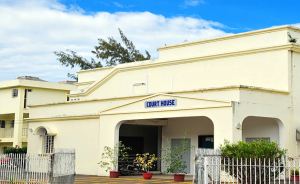CHIEF COMMISSIONER’S OFFICE
JUDICIAL SERVICES
About Us

The Republic of Mauritius has a single-structured judicial system consisting of two parts – the Supreme Court and subordinate courts. The Subordinate Courts consist of the Intermediate Court, the Industrial Court, the District Courts, the Bail and Remand Court and the Court of Rodrigues.
Unlike other courts, the Court of Rodrigues sits as Supreme Court of first instance and all cases before the subordinate courts (Intermediate Court (Civil & Criminal), Industrial and District Court.
The Magistrate for Rodrigues has within Rodrigues the same powers and jurisdiction as are conferred on every District Magistrate in Mauritius.
He has also jurisdiction to hear and dispose of any case referred to in section 112 (d) and (f) of the Courts Act which in Mauritius, would upon a reference by the Director of Public Prosecution, be cognizable by the Intermediate Court.
The Court of Rodrigues is governed by the Court of Rodrigues Jurisdiction Act.
Vision
- To maintain an impartial and efficient justice system that upholds the rule of law and provides modern, easy and fast access to justice to all
Services Provided
As far as the Court of Rodrigues is concerned, justice is administered by a full time Magistrate and a Visiting Judge of the Supreme Court. The Magistrate hears and determines cases having jurisdiction of district court, intermediate court, bail matters, industrial cases, both criminal and civil jurisdictions.
(A) THE DISTRICT COURT
Section 93 of the Courts Act established a court in every district known as a District Court and it is a court of record having limited jurisdiction in civil and criminal matters.
The Court of Rodrigues is presided by a Magistrate known as a District Magistrate (Section 94 of the Courts Act).
(i) Civil Jurisdiction
A District Court has jurisdiction in all cases where the sum or matter in dispute does not exceed the prescribed amount (Rs 250,000) (Section 104 of the Courts Act).Conversely, District Magistrates have exclusive jurisdiction in landlord and tenant disputes, irrespective of the amount of the claim for non-payment of rent.
(ii) Criminal Jurisdiction
A District Court has criminal jurisdiction to try all offences except those mentioned in section 116 of the Courts Act. It shall not award against any person imprisonment with or without hard labour not exceeding 5 years and a fine not exceeding Rs 100,000 (Section 114 of the Courts Act).
(iii) Appeal
An appeal against any final judgment of a District Court lies to the Supreme Court. A notice of appeal must be given within 21 days from the date of judgment [Sections 36 and 37 of the District and Intermediate Court (Civil Jurisdiction) Act; Sections. 92 to100 of the District and Intermediate Court (Criminal Jurisdiction) Act.
(iv) Small Clain
By Section of the Judicial Provisions Act, the District Courts are given jurisdiction to hear small claims. The Court of Rodrigues can adjudicate on minor claims not exceeding Rs 100,000 lodged by litigants themselves in a summary and expeditious manner..
(v) Protection against domestic violence
All District Courts have jurisdiction to hear complaints of Domestic Violence as provided by the Domestic Violence Act.
(B) THE INTERMEDIATE COURT
The Intermediate Court has the following jurisdictions:
(I) Civil Division of the Intermediate Court
The Intermediate Court has jurisdiction in all civil cases where the claim or matter in dispute does not exceed Rs 2,000,000. The Bench of the Intermediate Court is constituted by one or more Magistrates, as may be decided by the President.
(ii) Criminal Division of the Intermediate Court
The Intermediate Court has jurisdiction to hear and determine serious criminal offences referred to it by the Director of Public Prosecutions. It has power to inflict penal servitude on convicted offenders for a period not exceeding fifteen years and imprisonment for a period not exceeding ten years. However, for persistent offenders, the Intermediate Court may increase the sentence to twenty years’ penal servitude. The Intermediate Court is also empowered to inflict a higher sentence for offences under the Dangerous Drugs Act and certain specific offences, for example, rape and money laundering offences.
(iii) Financial Crimes Division of the Intermediate Court
The Financial Crimes Division deals with financial crime offences or ancillary to a financial crime offence as may be referred to it by the Director of Public Prosecutions.
(C) INDUSTRIAL COURT
The Industrial Court was established by section 3 of the Industrial Court Act. It has exclusive civil and criminal jurisdiction to try any matter arising out of the enactments set out in the 1st schedule of the Act or of any regulations made under those enactments (which relate to labour laws).
(D) SUPREME COURT
The District Magistrate of the Court of Rodrigues has been empowered to deal with Supreme Court cases at formal level. Supreme Court sessions are held thrice yearly and a Visiting Judge presides over those cases, hears and determines and gives judgment.
Other Services :
- Collection of payment of fines, various Court fees, suitor’s monies (for the release on bail)
- Extra judicial acts:-Interpretation and swearing of affidavits
- Rectification of civil status acts
- Processing applications for tardy declaration of birth
- Processing applications for legal aid
- Dealing with Chambers cases (receiving members of the public and sorting out solutions)
- Sales of exhibits
- Auction sale of market stalls
CONTACT DETAILS
Court House
- Port Mathurin, Rodrigues
- +230 83 12 970
